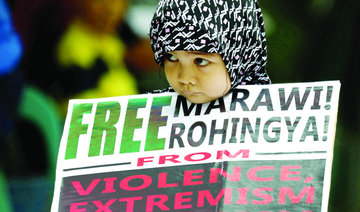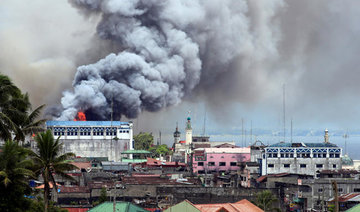MANILA: The US Federal Bureau of Investigation (FBI) has confirmed the death of Isnilon Hapilon, Daesh’s designated emir in Southeast Asia, in a dawn military assault last Monday in Marawi City.
Hapilon, a US-designated terrorist, was a senior leader of the Abu Sayyaf Group (ASG). The FBI “has confirmed that the DNA sample taken from a body recovered by our operating units in Marawi matches that of Isnilon Hapilon,” Philippine Defense Secretary Delfin Lorenzana said Saturday.
“This process of verification is also being conducted on the cadavers of the other terrorists that have been recovered so far.”
Lamont Siller, the FBI’s legal attaché at the US Embassy in Manila, confirmed the news. “Yes that’s correct,” he told Arab News.
Siller said the FBI is still working to confirm the death of Omar Maute, who along with his brother Abdullah formed the group that attacked and held parts of Marawi City since May 23.
The military earlier announced the killing of Hapilon and Omar as government forces made a final push to reclaim Marawi and end the nearly five-month siege of the country’s only Islamic city by the Daesh-backed Maute group.
Hapilon is said to have served in several senior positions in the ASG since at least 1997. The ASG has a reputation for brutality, including beheading its kidnap victims.
He gained international notoriety in 2001 for his involvement in the abduction of 20 tourists — including three Americans identified as Guillermo Sobero, and Martin and Gracia Burnham, a missionary couple — from the Dos Palmas resort in Palawan.
Sobero was beheaded as a “birthday present” for then-Philippine President Gloria Macapagal-Arroyo.
Martin died in the crossfire during a rescue attempt by Philippine troops in June 2002. Gracia was injured, but was rescued and repatriated to the US.
According to information from the US Department of Justice, Hapilon was indicted in the District of Columbia for his alleged involvement in terrorist acts against American and other foreign nationals in and around the Philippines. A $5-million bounty was placed on his head.
In 2014, Hapilon and his faction pledged allegiance to Daesh, but it was not until 2016 that he was acknowledged by the terrorist organization as its leader in Southeast Asia.
Daesh reportedly made direct contact with Hapilon in late 2016, instructing him to find an area to establish a caliphate in the southern Philippines.
On Wednesday, the military said Hapilon and Omar were trying to escape war-torn Marawi and abandon their own men when they were killed by government troops. Omar was killed by a sniper headshot, and Hapilon by three bullets to his chest.
They led the Marawi siege, which left more than 1,000 people dead, including 897 militants, 47 civilians and 164 government troops. More than 350,000 residents have been displaced.
One day after the deaths of Hapilon and Omar, President Rodrigo Duterte declared Marawi City free of terrorists. Despite this, operations continue to flush out terrorists in the city.
On Wednesday night, another high-value target, Malaysia’s most wanted terrorist Dr. Mahmud Ahmad, was killed by government forces.
Ahmad, whose body has yet to be recovered, had been touted as a possible successor to Hapilon as Daesh’s emir in Southeast Asia.
Experts say Daesh has suffered a major setback in East Asia with the deaths of Hapilon and Omar.
“It’s a huge blow to Daesh... and any dreams it has of establishing a caliphate here,” Steve Cutler, an international security analyst and former head of the FBI in Manila, told Arab News. “Their replacements won’t be the charismatic leaders of the caliber of these two.”
But political analyst Ramon Casiple told Arab News that their deaths are a “temporary setback for Daesh” that will not stop it from pursuing its agenda.
“Daesh is a regional organization,” Casiple said, adding that the loss of Hapilon and Omar does not mean it has no more supporters or sympathizers in the Philippines.
FBI confirms death of Isnilon Hapilon in Marawi
FBI confirms death of Isnilon Hapilon in Marawi

FGM reports add to scrutiny of Somali community in Minnesota

CHICAGO: The US state of Minnesota has reportedly seen a rise in instances of female genital mutilation, or FGM, especially among the growing Somali community.
More than 260,000 Somalis live in the US, with nearly 100,000 of them settled in Minnesota. About 50,000 Somalis live in Minnesota’s 5th Congressional District, represented by Somali American Rep. Ilhan Omar.
UN data shows that nearly 98 percent of Somalia’s female population aged between 15 and 49 have undergone the procedure.
The controversy over FGM in Minnesota has only added to the dark cloud of alleged fraud that is hanging over the state’s Somali community. US President Donald Trump made this subject a major part of his State of the Union speech on Tuesday, calling the fraudsters “Somali pirates.”
State and federal investigators have said Somalis in Minnesota have been implicated in the theft of billions of dollars in state and federal funds intended to support childcare, food programs for families and seniors, and healthcare and mental health programs. Officials contend that this has resulted in the loss of up to $9 billion in funding over many years. In his State of the Union speech, however, Trump said the fraud has cost American taxpayers as much as $19 billion.
Muslim leaders are speaking out against the practice of FGM. Imam Kifah Mustapha of the Orland Prayer Center, one of the largest mosques in Illinois, said FGM is not representative of Muslim religious practices and is not required by Islam.
“There is nothing in Islam that says it should be done as an obligation. There’s no such thing,” Mustapha told Arab News.
“It is not something that Islam urges parents or families to do for their children at all. It is not practiced at all in most Muslim countries. It is not something Islam urges people to do or obligates people to do. We know that most Muslim countries now even prohibit it, they don’t allow it anymore.”
Congress first banned FGM on girls under the age of 18 in 1996. However, a 2018 federal court ruling struck down that law as unconstitutional. President Trump toughened the law and signed the Stop FGM Act into law in 2021, imposing a penalty of up to 10 years’ imprisonment for anyone convicted.
Forty-one US states, including Minnesota, have enacted their own laws banning FGM. The nine states that have failed to adopt bans are Alabama, Alaska, Connecticut, Hawaii, Maine, Mississippi, Montana, Nebraska and New Mexico, all states with small Muslim populations.
Minnesota was one of the first states to pass an FGM law in 1994. State Rep. Mary Franson has been fighting ever since to strengthen its enforcement. She recently told the media that cultural secrecy makes FGM “exceptionally difficult to detect” in tight-knit communities.
Somali-born activist Ayaan Hirsi Ali, an author who survived FGM and has spoken out against it, has publicly described the lasting physical and psychological damage that she experienced. Hirsi Ali has called for a strong legal response.
Hirsi Ali was on Sunday quoted as saying: “Female genital mutilation is violence against the most vulnerable — children. It causes infection, incontinence, unbearable pain during childbirth and deep physical and emotional scars that never heal. Religious or cultural practices that deliberately and cruelly harm children must be confronted. No tradition can ever justify torture.”
In 2018, the UN Population Fund released a report showing that nearly 70 million girls will undergo FGM between 2015 and 2030.














